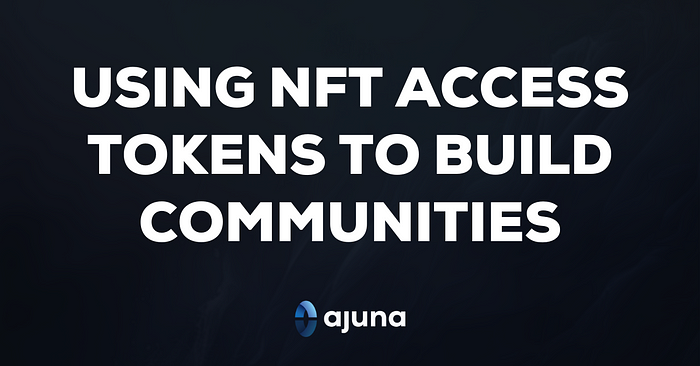Using NFT Access Tokens to Build Communities

Leaving the community out of the game development process can harm a developer’s reputation, as seen with Cyberpunk 2077. Without community input, the final product may not live up to player expectations. An active player base is crucial for the success of online games, just as a social network needs members to thrive. In addition, games like Minecraft and Roblox prove that gamers are no longer merely passive users, but rather integral parts of the gaming process, which makes communities even more valuable.
With the advancement of digital technologies, perhaps these communities won’t be confined to one platform for much longer and by engaging with their communities through any platform that is convenient for them, members will be able to express their voices more meaningfully. For instance, while Discord serves as the primary gated community hub, Ajuna developers could use GitHub, and site visitors could access Medium.
However, building communities without motivating and rewarding your core audience becomes increasingly challenging. The cost and time involved in breaking through the noise are high. Ajuna’s solution? Using NFTs as community-building access tokens. Indeed, NFTs can provide access to an online community, but only if you already have a user base and a group of project aficionados ready to be molded into one community.
As you can see, Web3 games are not the only ones constantly restructuring and reforming their communities, and popular interests can change as well. However, the human desire to bond over shared interests will always persist. It is for this reason that we consider Access Tokens to be one of the best NFT use cases currently available: they serve as a means to accessing communities, experiences, web games, and items in the Metaverse or in reality.
Considering how many brands and businesses creating Web3 communities today do so by hosting their own server on Discord or Telegram and setting up gated rooms to give their members access to exclusive content, it makes sense to use NFT as an unlocking protocol. This way, their members can also attend community meetups and parties, which contribute to the project’s perceived value.
Ajuna Tokens — Building Blocks of Ajuna Community
It is the combination of community and technology that creates a network. In the absence of the community, Ajuna Network would only exist as code. Thus, Ajuna cultivates a wide community of stakeholders, each with their own characteristics and potential to join the Ajuna Crew.
Furthermore, incentives will be offered to Ajuna Network members who have a history of adding value to the community. As a matter of fact, we take stakeholders and token holders on board from day one, and devs also get to access gated community channels earlier than the rest. However, none of these would have been possible without AJUN and BAJU, two of Ajuna’s tokens.
- The AJUN token acts as the Ajuna Network’s main utility token, enabling users to access its services and take part in staking and governance activities. Additionally, owners of AJUN tokens have the power to shape the direction of the Ajuna Network and gaming franchises (one important component of their governance will be determining how Ajuna’s Treasury funds will be used).
- Kusama’s corresponding token is called BAJU. The supply and distribution of BAJU’s tokens will be different from current token economic behavior in order to support the network’s distinct objectives and characteristics of fueling the engagement of the community.
Ajuna’s Community Was Initially Founded to Fill a Need
In order to change the status quo, there was a need to get more creative minds behind games to embrace, experiment and ultimately utilize all that blockchain technology can offer. To achieve this, game developers needed a simpler way to integrate blockchain-based assets into their games, and gamers needed to feel like they belong to the game’s community. But that was all before Ajuna Network offered a unique solution that enhanced any blockchain gaming experience independent of its current chain integration.
By bridging gaming ecosystems built on other chains to Ajuna Network, games and markets can access a fully decentralized game engine infrastructure and profit from Ajuna’s functionalities — independent of their initial ecosystem choice.
Ajuna Network is a full-featured, trusted, and secure blockchain, with the sole purpose of providing essential needs and features for gaming. As the network and ecosystems grow, so will the interoperability of Ajuna at different levels: Within its own ecosystems and all games that run on Ajuna, as well as throughout the entire Polkadot ecosystem, and even beyond, thanks to the many multichain interoperability initiatives currently underway with other Layer 1 protocols.
Our growing ecosystem enables game studios to raise funds. In addition, our go-to-market strategy is easy to implement (support fundraising strategy, establish connections with fundraising networks, implement token economics, leverage Ajuna marketing channels, gaming community access, etc.), providing support throughout the project’s lifespan (NFT incentives, limited editions, tournament participation, participation in the community, etc.), ensuring a fast and efficient launch on our ecosystem cycle.
About Ajuna Network
Ajuna Network is a Switzerland-based decentralized gaming platform bringing blockchain gaming into the mainstream by integrating GameFi functionality with the world’s leading development engines, Unreal and Unity. Built on Substrate, Ajuna leverages the full potential of the Polkadot ecosystem to provide developers with a modular toolbox to easily add fully-featured GameFi functionalities to their games. Ajuna’s ultimate goal is to create real value for both gamers and developers by providing a fully interoperable decentralized ecosystem for games and virtual goods.
Join our community here: https://discord.gg/ajunanetwork

